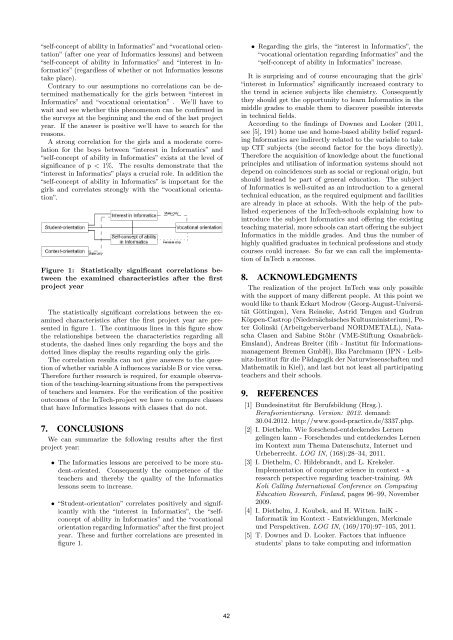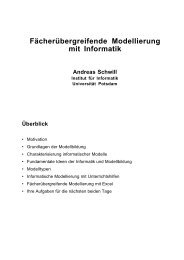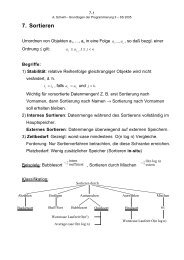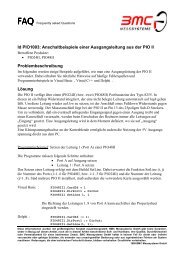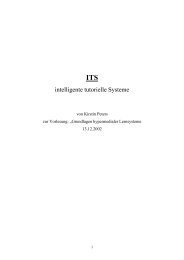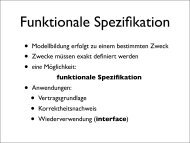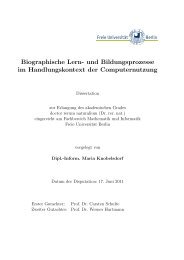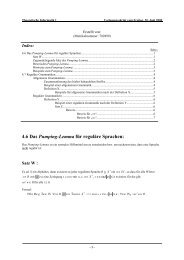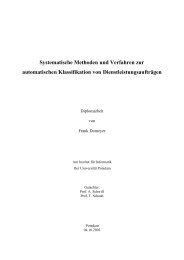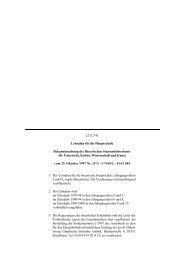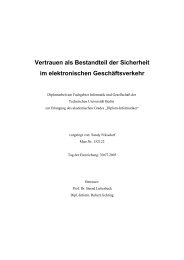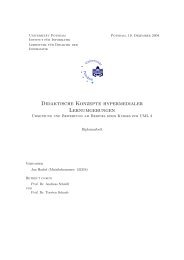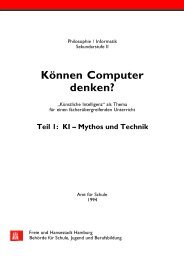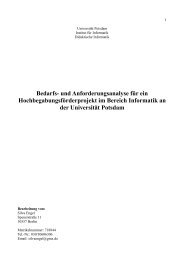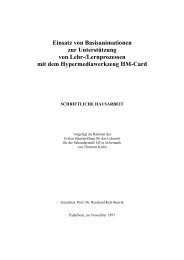Maria Knobelsdorf, University of Dortmund, Germany - Didaktik der ...
Maria Knobelsdorf, University of Dortmund, Germany - Didaktik der ...
Maria Knobelsdorf, University of Dortmund, Germany - Didaktik der ...
Create successful ePaper yourself
Turn your PDF publications into a flip-book with our unique Google optimized e-Paper software.
“self-concept <strong>of</strong> ability in Informatics” and “vocational orientation”<br />
(after one year <strong>of</strong> Informatics lessons) and between<br />
“self-concept <strong>of</strong> ability in Informatics” and “interest in Informatics”<br />
(regardless <strong>of</strong> whether or not Informatics lessons<br />
take place).<br />
Contrary to our assumptions no correlations can be determined<br />
mathematically for the girls between “interest in<br />
Informatics” and “vocational orientation” . We’ll have to<br />
wait and see whether this phenomenon can be confirmed in<br />
the surveys at the beginning and the end <strong>of</strong> the last project<br />
year. If the answer is positive we’ll have to search for the<br />
reasons.<br />
A strong correlation for the girls and a mo<strong>der</strong>ate correlation<br />
for the boys between “interest in Informatics” and<br />
“self-concept <strong>of</strong> ability in Informatics” exists at the level <strong>of</strong><br />
significance <strong>of</strong> p < 1%. The results demonstrate that the<br />
“interest in Informatics” plays a crucial role. In addition the<br />
“self-concept <strong>of</strong> ability in Informatics” is important for the<br />
girls and correlates strongly with the “vocational orientation”.<br />
Figure 1: Statistically significant correlations between<br />
the examined characteristics after the first<br />
project year<br />
The statistically significant correlations between the examined<br />
characteristics after the first project year are presented<br />
in figure 1. The continuous lines in this figure show<br />
the relationships between the characteristics regarding all<br />
students, the dashed lines only regarding the boys and the<br />
dotted lines display the results regarding only the girls.<br />
The correlation results can not give answers to the question<br />
<strong>of</strong> whether variable A influences variable B or vice versa.<br />
Therefore further research is required, for example observation<br />
<strong>of</strong> the teaching-learning situations from the perspectives<br />
<strong>of</strong> teachers and learners. For the verification <strong>of</strong> the positive<br />
outcomes <strong>of</strong> the InTech-project we have to compare classes<br />
that have Informatics lessons with classes that do not.<br />
7. CONCLUSIONS<br />
We can summarize the following results after the first<br />
project year:<br />
• The Informatics lessons are perceived to be more student-oriented.<br />
Consequently the competence <strong>of</strong> the<br />
teachers and thereby the quality <strong>of</strong> the Informatics<br />
lessons seem to increase.<br />
• “Student-orientation” correlates positively and significantly<br />
with the “interest in Informatics”, the “selfconcept<br />
<strong>of</strong> ability in Informatics” and the “vocational<br />
orientation regarding Informatics”after the first project<br />
year. These and further correlations are presented in<br />
figure 1.<br />
42<br />
• Regarding the girls, the “interest in Informatics”, the<br />
“vocational orientation regarding Informatics” and the<br />
“self-concept <strong>of</strong> ability in Informatics” increase.<br />
It is surprising and <strong>of</strong> course encouraging that the girls’<br />
“interest in Informatics” significantly increased contrary to<br />
the trend in science subjects like chemistry. Consequently<br />
they should get the opportunity to learn Informatics in the<br />
middle grades to enable them to discover possible interests<br />
in technical fields.<br />
According to the findings <strong>of</strong> Downes and Looker (2011,<br />
see [5], 191) home use and home-based ability belief regarding<br />
Informatics are indirectly related to the variable to take<br />
up CIT subjects (the second factor for the boys directly).<br />
Therefore the acquisition <strong>of</strong> knowledge about the functional<br />
principles and utilisation <strong>of</strong> information systems should not<br />
depend on coincidences such as social or regional origin, but<br />
should instead be part <strong>of</strong> general education. The subject<br />
<strong>of</strong> Informatics is well-suited as an introduction to a general<br />
technical education, as the required equipment and facilities<br />
are already in place at schools. With the help <strong>of</strong> the published<br />
experiences <strong>of</strong> the InTech-schools explaining how to<br />
introduce the subject Informatics and <strong>of</strong>fering the existing<br />
teaching material, more schools can start <strong>of</strong>fering the subject<br />
Informatics in the middle grades. And thus the number <strong>of</strong><br />
highly qualified graduates in technical pr<strong>of</strong>essions and study<br />
courses could increase. So far we can call the implementation<br />
<strong>of</strong> InTech a success.<br />
8. ACKNOWLEDGMENTS<br />
The realization <strong>of</strong> the project InTech was only possible<br />
with the support <strong>of</strong> many different people. At this point we<br />
would like to thank Eckart Modrow (Georg-August-Universität<br />
Göttingen), Vera Reineke, Astrid Tengen and Gudrun<br />
Köppen-Castrop (Nie<strong>der</strong>sächsisches Kultusministerium), Peter<br />
Golinski (Arbeitgeberverband NORDMETALL), Natascha<br />
Clasen and Sabine Stöhr (VME-Stiftung Osnabrück-<br />
Emsland), Andreas Breiter (ifib - Institut für Informationsmanagement<br />
Bremen GmbH), Ilka Parchmann (IPN - Leibnitz-Institut<br />
für die Pädagogik <strong>der</strong> Naturwissenschaften und<br />
Mathematik in Kiel), and last but not least all participating<br />
teachers and their schools.<br />
9. REFERENCES<br />
[1] Bundesinstitut für Berufsbildung (Hrsg.).<br />
Berufsorientierung. Version: 2012. demand:<br />
30.04.2012. http://www.good-practice.de/3337.php.<br />
[2] I. Diethelm. Wie forschend-entdeckendes Lernen<br />
gelingen kann - Forschendes und entdeckendes Lernen<br />
im Kontext zum Thema Datenschutz, Internet und<br />
Urheberrecht. LOG IN, (168):28–34, 2011.<br />
[3] I. Diethelm, C. Hildebrandt, and L. Krekeler.<br />
Implementation <strong>of</strong> computer science in context - a<br />
research perspective regarding teacher-training. 9th<br />
Koli Calling International Conference on Computing<br />
Education Research, Finland, pages 96–99, November<br />
2009.<br />
[4] I. Diethelm, J. Koubek, and H. Witten. IniK -<br />
Informatik im Kontext - Entwicklungen, Merkmale<br />
und Perspektiven. LOG IN, (169/170):97–105, 2011.<br />
[5] T. Downes and D. Looker. Factors that influence<br />
students’ plans to take computing and information


